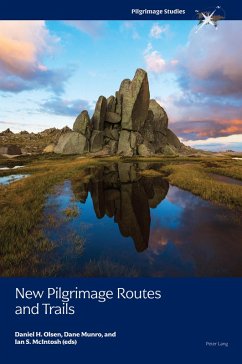
Pilgrimage-The Sacred Art (eBook, ePUB)
Journey to the Center of the Heart
Versandkostenfrei!
Sofort per Download lieferbar
8,95 €
inkl. MwSt.
Weitere Ausgaben:

PAYBACK Punkte
4 °P sammeln!
Explore the many dimensions of the pilgrimage experience and change your orientation to the world."Pilgrimage is an opportunity for pilgrims to cultivate their inner life (or inner voice) in a way that leads to a greater sense of peace and compassion-a sense that pervades all of life."-From Chapter 6, "Preparing to Practice"Pilgrimage is a spiritual practice of nearly every major religion of the world. If you are a Christian you may travel to sites associated with the life of Jesus; Jews might visit the Western Wall in the Old City of Jerusalem and other sacred places in the Holy Land of Israe...
Explore the many dimensions of the pilgrimage experience and change your orientation to the world.
Pilgrimage is a spiritual practice of nearly every major religion of the world. If you are a Christian you may travel to sites associated with the life of Jesus; Jews might visit the Western Wall in the Old City of Jerusalem and other sacred places in the Holy Land of Israel; Muslims participate in the Hajj, the journey to Mecca; Buddhists visit the sacred sites related to the life of Buddha. Even if you practice no religion at all you will still find that you most likely participate in this practice-the Jefferson Memorial in Washington, DC, and Lenin's tomb in Moscow are considered national pilgrimage sites. As a spiritual practice, pilgrimage transcends religious, national, cultural and linguistic boundaries.
This fascinating look at the sacred art of pilgrimage integrates spirituality, practice, spiritual formation, psychology, world religions and historical resources. It examines how the world's religious pilgrimages evolved as central spiritual practices and the relationship between pilgrimage and transformation. It explains what makes a place holy, and why and how some sites are so compelling that they attract thousands, even millions of pilgrims each year.
"Pilgrimage is an opportunity for pilgrims to cultivate their inner life (or inner voice) in a way that leads to a greater sense of peace and compassion-a sense that pervades all of life."
-From Chapter 6, "Preparing to Practice"
Pilgrimage is a spiritual practice of nearly every major religion of the world. If you are a Christian you may travel to sites associated with the life of Jesus; Jews might visit the Western Wall in the Old City of Jerusalem and other sacred places in the Holy Land of Israel; Muslims participate in the Hajj, the journey to Mecca; Buddhists visit the sacred sites related to the life of Buddha. Even if you practice no religion at all you will still find that you most likely participate in this practice-the Jefferson Memorial in Washington, DC, and Lenin's tomb in Moscow are considered national pilgrimage sites. As a spiritual practice, pilgrimage transcends religious, national, cultural and linguistic boundaries.
This fascinating look at the sacred art of pilgrimage integrates spirituality, practice, spiritual formation, psychology, world religions and historical resources. It examines how the world's religious pilgrimages evolved as central spiritual practices and the relationship between pilgrimage and transformation. It explains what makes a place holy, and why and how some sites are so compelling that they attract thousands, even millions of pilgrims each year.
Dieser Download kann aus rechtlichen Gründen nur mit Rechnungsadresse in A, D ausgeliefert werden.













